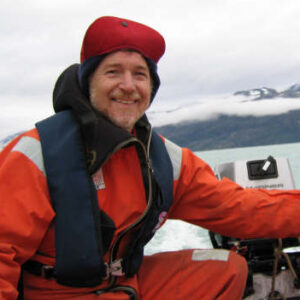Edinburgh University Students’ Association’s Student-Led Teaching Awards are back to recognise outstanding members of learning and support staff. After a challenging year for everyone, we’re celebrating our worthy nominees by shouting about their successes across our digital platforms.

What is your full name?
Simon Harley
What is your job title?
Professor and Academic Head of Facilities
What school or service do you work in?
GeoSciences
Please tell us a little bit about yourself and your role.
I have worked at the University of Edinburgh since 1988. Prior to that time I was a Lecturer and College Fellow at Oxford, having taken up my post there after a two-year post-doctoral assistantship at ETH-Zurich. I studied towards my PhD in metamorphic petrology at the University of Tasmania, graduating in 1982 after four great years working both in the experimental labs and in Enderby Land, East Antarctica.
I have a passion for Antarctica and its geology, and have maintained that as one focus of my research, which is more broadly centred around high-temperature (and ‘UHT’) metamorphism, crustal evolution and the formation and evolution of continents. For a decade from 2007 I advised the UK government on nuclear waste management, a role that led to my interest – both in research and teaching – on the managment and disposal of nuclear waste.
Over my time in Edinburgh I have taught on or led several courses, from first year undergraduate Earth Dynamics to later year courses in field geology (I have led some 40 field courses up in NW Scotland whilst in Edinburgh!) metamorphic geology, geochemistry and mineralogy courses, and to final year and masters level courses including Advances in Metamorphism, Antarctica – the Evolution of a Continent, the Formation and Evolution of Continents (shorthand – FEC), and most recently Nuclear Waste Management – Principles, Policies and Practice (shorthand – NWMPPP). The latter two courses are those that I have been teaching online over the current pandemic period in this academic year.
In my teaching and learning role I strive to provide what I hope is stimulating and enlightening lectures and course materials on FEC and NWMPPP, coupled with live sessions discussing the issues and points raised in my asychronous lectures. This has been challenging this year, but ultimately very rewarding when it becomes apparent that the students have gained new insights and found new interests in these subjects. I have several other roles, including the usual research student supervision, research project management and research itself but also being the PI of our NERC Ion Microprobe Facility and, for the School, being its Academic Head of Facilities – a strategic management role. Outwith the University I am on the editorial boards of a number of international journals, have chaired or participated in a number of expert panels on energy policy and nuclear waste for the Royal Society of Edinburgh, and am involved with the NW Highlands Geopark. Plenty of things to keep me busy!
What does it mean to you to have been nominated for a Teaching Award this year?
It is both humbling and really rewarding to have been nominated. As alluded to above, it has been quite challenging developing material for online delivery and attempting to ensure that it conveys the appropriate level of technical detail but remains interesting and perhaps even inspiring for the students. My students have been incredibly positive in their approach to the online learning, coping well with the glitches it throws up every now and then, and bearing with me during struggles with the various bits of software, not to mention loss of internet. The quality of work my students produced for their assessments in the Semester 1 FEC course was particularly gratifying. It has been really good to work with them in making the most of the year despite the many difficulties they will have faced throughout it. So, it is great to have been appreciated by them and nominated for a Teaching Award.
What’s your favourite part of your role and working with students?
I really enjoy conveying the fantastic insights we now have into the workings of the Earth and the earliest records of its evolution. It is great to get feedback from students and use that to improve both what I try to convey and the manner of it. Working with students gives me the opportunity to really think about the assumptions one tacitly makes, and to explain from first principles why something works or is important – and that is true for both my geological work and the nuclear waste aspects.
How have you adapted your approach to teaching and supporting students under the Hybrid Model this year?
Yes, there have been challenges! I now provide asynchronous lectures, followed later in the same week by a live discussion / recapitulation / and Q&A on the lecture content. I found that it is best to segment a normal lectures into what I term ‘vignettes’ that are perhaps 20 minutes in length (sometimes longer!), and record those as separate events. I have also found (for the Semester 1 FEC course, and also for my part of a third year Petrology course to be given in March) that it is optimal to write out extensive notes for each lecture vignette and provide static PowerPoint or PDF slides with those notes – either as an adjunct to or in lieu of online captioning.
What’s been the biggest challenge in your role this year?
Developing, producing and recording my vignettes, especially from at home where internet is not always A1, and in particular waiting for the files to upload and then go through the captioning process. There is simply no quality time available in my schedule to correct all the captions (I have developed and delivered the equivalent of 26 lectures so far since April 2020, thats about 60 vignettes), so I have had to make my apologies and leave them as is – comical, informative or not. The deeply annotated PDFs of the lectures/vignettes provide a better and clearly appreciated resource.
What would you say to the student(s) who nominated you, or students who are considering submitting a nomination for a staff member who has had an impact on them?
I really appreciate that you took the time to nominate me, and even more so really appreciate that you have found the courses useful, interesting and hopefully inspiring. I am really happy to have been nominated, it is a real boost!
To find out more about the Teaching Awards and browse nomination categories, please visit the Students’ Association’s website.



Nice one, brother! :0)